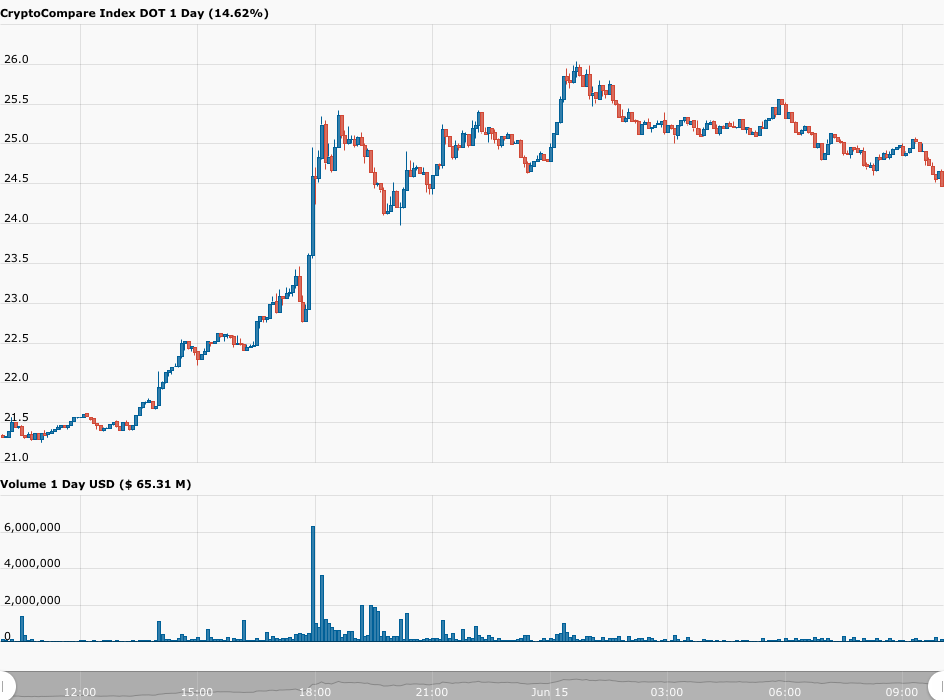Recently, Ken Seiff, Managing Partner at crypto-focused venture capital firm Blockchange Ventures, shared his firm’s reasons for “being excited” by the Polkadot project.
Below are some highlights from Seiff’s comments about Polkadot in an essay (titled: “Polkadot Analysis: June 2021”) that he published on June 9:
- “It enables interoperability among blockchains by providing a common frame of reference across all chains to which it is connected. At the same time, it substantially mitigates security concerns around emergent chains as they attempt to launch and scale, removing a key obstacle to new chain adoption and addressing a fundamental downside of blockchain proliferation.“
- “Polkadot allows companies and developers to use and create the blockchains best suited for their unique needs without the risk of ending up as an isolated and potentially irrelevant silo.“
- “The Polkadot protocol also removes the scale-as-security challenge through an innovative approach to shared security, designed to enable the collective interoperability and security of chains without sacrificing performance or customization.“
- “By allowing applications to run on their own layer-1 blockchains (and more generally, by spreading application activity and transactions across multiple blockchains), Polkadot can enable more decentralized and scalable blockchain applications. By splitting things up in this manner — rather than forcing all applications and activity to reside on a single blockchain — Polkadot allows transactions to run in parallel rather than one at a time. This could increase the overall speed and scalability of blockchain applications by as much as 1000x compared to Ethereum.“
- “… Substrate materially improves Polkadot’s odds of becoming the leading interoperability protocol because Substrate chains are automatically compatible with Polkadot. In other words, every new blockchain built on Substrate will automatically increase the number of blockchains and the potential user base. This combination will create a third network effect for Polkadot.“
- “Polkadot’s adoption is real and accelerating. Three years after committing its first line of code, Polkadot has outrun Ethereum’s developer count at that same milestone as was recently shown by analysis from Electric Capital . Staking milestones have followed a similar trajectory. Polkadot token holders have joined together in force to consistently make the network one of the largest by value of assets staked — resulting in stronger security and rewarding an already active community.“
- “Polkadot’s ability to offer the upside of purpose-built chains (which can be created with Substrate) paired with the power of its interoperability and shared security is a trifecta that we believe will leverage its three network effects to result in a monopoly or oligopoly outcome.“
- “Polkadot’s success in executing its mission is enabled by one of the most impressive teams we have seen in the space. Parity Technologies was co-founded in 2015 by Dr. Jutta Steiner and Dr. Gavin Wood. Steiner was previously Ethereum’s original Security Chief, while Wood was Ethereum’s Co-founder and former CTO. Wood also invented the Ethereum Virtual Machine and the Solidity programming language — two foundational blockchain elements that power nearly half of the top twenty crypto-networks by value and supports hundreds of billions in market capitalization for the entire industry.“
- “During the summer of 2016, Wood announced the vision for Polkadot and its intent to build this protocol to connect all the world’s blockchains and added Peter Czaban and Thiel Fellow Robert Habermeier as cofounders to build the protocol alongside Wood. It should be noted that Wood is also a part time General Partner at Blockchange Ventures.“
- “Polkadot solves for the global interoperability, scalability, and security issues endemic to all blockchains while addressing application-specific solutions and needs. Its brilliance lies in the comprehensiveness of its solution: by addressing interoperability and security simultaneously, Polkadot removes potential brakes on the broader space’s utility and efficiency and facilitates the success of specialized blockchain applications. We believe this positions Polkadot as one of the fulcrums of the entire sector.“
Yesterday, crypto exchange Coinbase finally announced that Coinbase Pro, its platform experienced and professional traders, has started accepting inbound transfers of $DOT and that trading will begin on/after 16:00 UTC on June 16 providing that “liquidity conditions are met”.
Coinbase also mentioned that “Support for DOT will generally be available in Coinbase’s supported jurisdictions with the exception of Singapore”.
According to data by CryptoCompare, currently (as of 09:03 UTC on June 15), $DOT is trading around $24.50, up 15.08% in the past 24-hour period.
DISCLAIMER
The views and opinions expressed by the author, or any people mentioned in this article, are for informational purposes only, and they do not constitute financial, investment, or other advice. Investing in or trading cryptoassets comes with a risk of financial loss.









